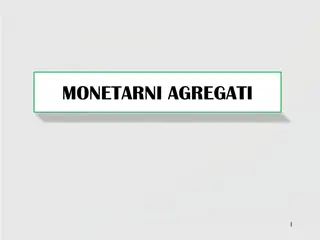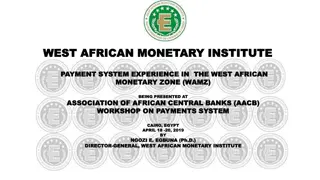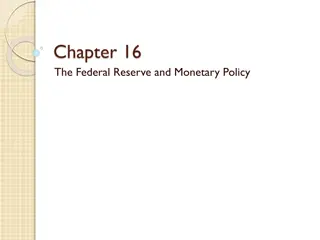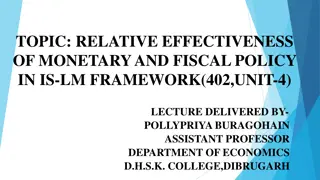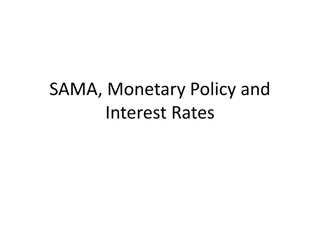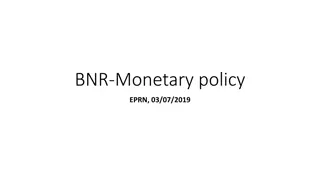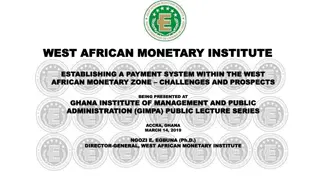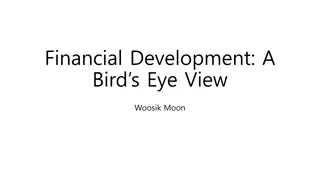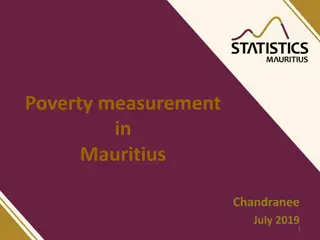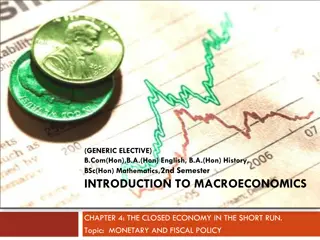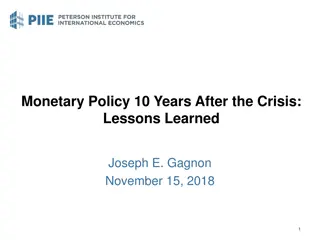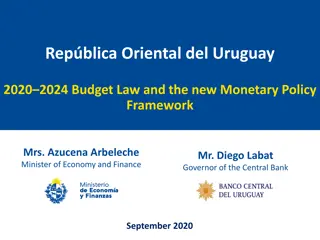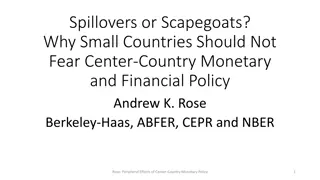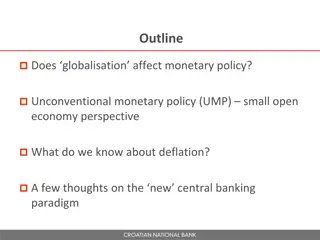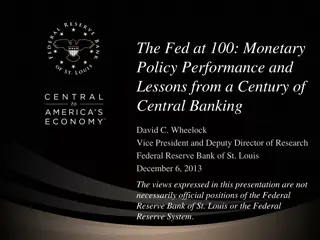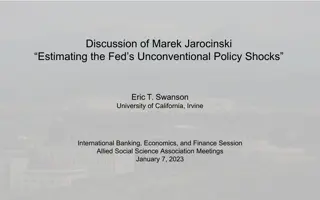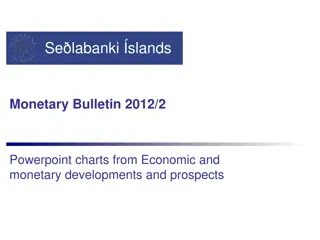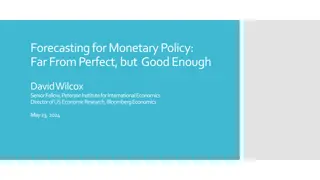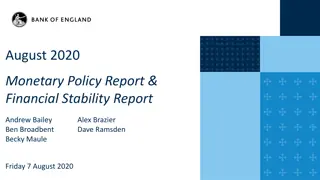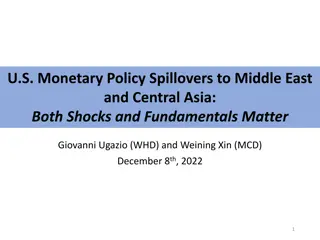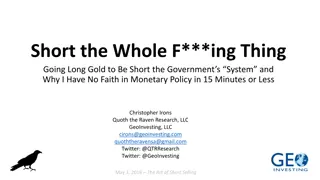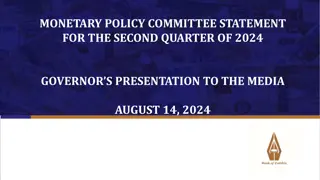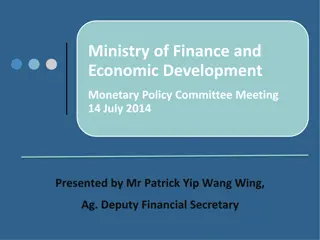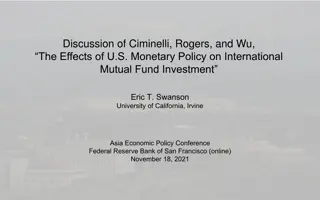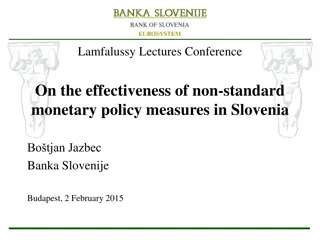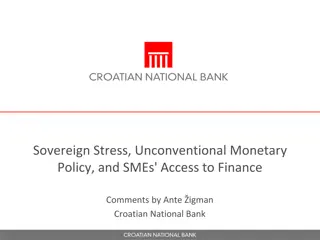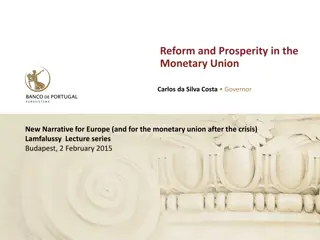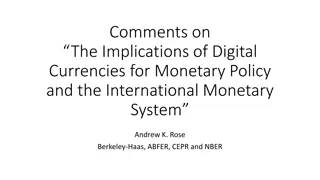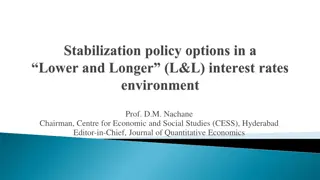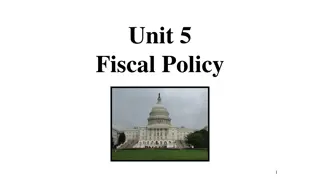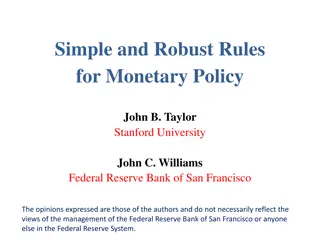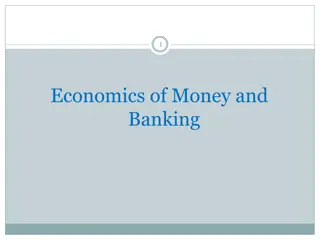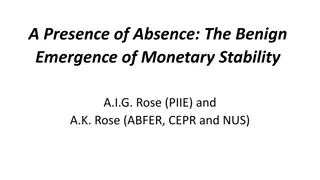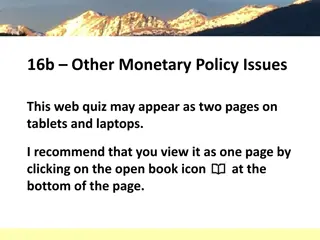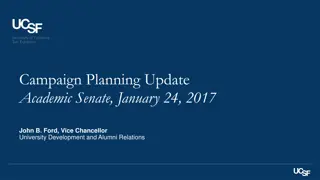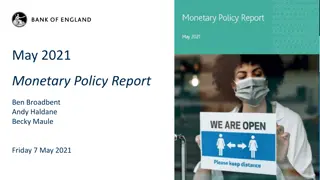Benefits of Coordinating Monetary Transfers for Beneficiaries
Coordinating monetary transfers provides various advantages for beneficiaries, including scalability, increased resources, speed, reduced duplication, improved targeting, better referral networks, enhanced links with social protection systems, improved communication, and harmonized approaches. This
4 views • 16 slides
Understanding Quantitative Credit Control Methods in RBI's Monetary Policy
RBI's monetary policy revolves around maintaining credit quantity in the market through quantitative credit control methods. This includes Bank Rate Policy, Open Market Operations, Cash Reserve Ratio (CRR), and Statutory Liquidity Ratio (SLR). These tools help regulate credit flow, liquidity, and ma
4 views • 8 slides
Overview of Monetary Aggregates in Bosnia and Herzegovina
Image descriptions and explanations about monetary aggregates, money as a payment instrument, cash in circulation, deposit money, M1, M2, M3 categories, and monetary base. Additionally, details on net foreign assets, net reserves, and changes in monetary policy affecting currency board arrangements
1 views • 17 slides
Development of West African Monetary Institute Payment System
The West African Monetary Institute (WAMI) has been instrumental in establishing a payment and settlement system within the West African Monetary Zone (WAMZ). The institute's efforts have focused on promoting cross-border transactions and economic integration among member countries, with the ultimat
0 views • 46 slides
Understanding the Federal Reserve System and Monetary Policy
Delve into the history, structure, and functions of the Federal Reserve System, including its role in implementing monetary policy to stabilize the economy. Explore the establishment of the Federal Reserve Act of 1913, the structure of the Federal Reserve, and its pivotal role in serving the governm
0 views • 35 slides
Understanding Monetary Policy Effectiveness in the IS-LM Framework
The relative effectiveness of monetary policy in influencing investment, employment, output, and income depends on the shape of the LM curve and the IS curve. A steeper LM curve signifies higher effectiveness as it indicates less interest elastic demand for money, resulting in significant changes in
0 views • 24 slides
Saudi Arabian Monetary Agency (SAMA) Overview
The Saudi Arabian Monetary Agency (SAMA) serves as the central bank of Saudi Arabia with a focus on managing the country's monetary policy, maintaining price stability, and supervising financial institutions. Established in 1952, SAMA's functions include managing the national currency, foreign excha
0 views • 24 slides
Understanding Money and Monetary Policy in Economics
Money serves as a medium of exchange, store of value, and unit of account in an economy. It is vital for economic transactions and stability. The quantity of money is measured using concepts like liquidity and monetary aggregates. The demand for money is linked to the Quantity Theory of Money, which
2 views • 12 slides
Challenges and Prospects of Establishing a Payment System in the West African Monetary Zone
The West African Monetary Zone (WAMZ) is striving to create a zonal payment and settlement system for cross-border transactions, aiming at economic integration for a common central bank and single currency. This initiative faces challenges but also holds promising prospects for regional financial in
3 views • 46 slides
Understanding Economic and Monetary Policies in Korea and Worldwide
This course provides an insightful exploration of major policy issues related to money, banking, and financial development globally and in Korea. It covers the goals and conduct of economic and monetary policies, the impact of money on economies, financial stability, and responses to depression and
1 views • 25 slides
Poverty Measurement in Mauritius: An Overview of Monetary and Non-Monetary Approaches
The measurement of poverty in Mauritius involves multidimensional assessments using both monetary and non-monetary approaches. The country's national priorities include poverty eradication, improving well-being, and ensuring inclusive growth. The monetary approach assesses poverty based on the Relat
1 views • 12 slides
Macroeconomic Policy Tools: Monetary and Fiscal Policy in Short Run
This chapter delves into the IS-LM model to illustrate the functioning of monetary and fiscal policies in influencing economic growth. It explains how these policies impact output, interest rates, and inflation rates in a closed economy in the short run. Monetary policy mainly operates through open
0 views • 18 slides
Monetary Policy 10 Years After the Crisis: Lessons Learned
Explore the evolution of monetary policy post-crisis, including definitions of monetary and fiscal policies, liquidity traps, and the Federal Reserve's actions during the Great Recession. Key lessons learned emphasize the importance of countercyclical policies, effective use of quantitative easing (
0 views • 8 slides
Economic Recovery and Fiscal Stability in Uruguay: Budget Law and Monetary Policy Framework 2020-2024
The Budget Law and Monetary Policy Framework in Uruguay for 2020-2024 focus on restoring fiscal consolidation, stabilizing debt, and implementing market-friendly policies for economic recovery. Successful COVID-19 containment strategies have allowed for a faster normalization of economic activity. L
2 views • 35 slides
Speaker Identification in Monetary Policy Meetings at Sveriges Riksbank
This study focuses on speaker identification in monetary policy meetings at Sveriges Riksbank, using a supervised approach to predict individual board members. By analyzing the anonymized minutes of meetings before June 2007 and known deliberations thereafter, the study aims to understand how increa
0 views • 18 slides
Small Countries' Resilience Against Center-Country Monetary Policies
Small countries should not fear the monetary and financial policies of larger center countries. This article discusses the potential spillovers of unconventional monetary policies by center countries, such as quantitative easing and negative nominal interest rates. It explores the concept of currenc
1 views • 39 slides
Globalisation's Impact on Monetary Policy and Central Banking Paradigm
Globalisation has reshaped monetary policy dynamics, influencing inflation pressures and the transmission of shocks across economies. Unconventional monetary policies in small open economies have challenged conventional theories, highlighting the complexity of managing monetary conditions. The inter
0 views • 24 slides
Evolution of Monetary Policy and Financial Stability: Lessons from the First 100 Years of the Federal Reserve
The Federal Reserve's journey over a century reflects the evolution of monetary policy and financial stability. From its founding to responses to crises like the Great Depression and Great Recession, the Fed's policies have adapted to changing economic landscapes. Understanding these historical even
0 views • 20 slides
Identifying Structural Shocks in Monetary Policy: Insights from Jarocinski and Swanson
Using fat-tailed distributions to identify structural shocks in monetary policy, Jarocinski and Swanson explore the effects of different policy changes such as fed funds rate adjustments, forward guidance, and bond purchases. Their findings align closely with previous research, highlighting the hete
0 views • 11 slides
Economic and Monetary Developments Outlook Presentation 2012/2
This presentation provides insights into the economic and monetary developments and prospects in Iceland as per the Monetary Bulletin of 2012/2. It includes charts depicting the economic outlook and key uncertainties faced by the region. The slides offer a comprehensive overview of the current econo
0 views • 84 slides
Challenges in Forecasting Monetary Policy Amid Economic Uncertainty
Economic forecasters faced challenges in predicting the impact of inflation post-pandemic, leading to delayed monetary policy adjustments by the Fed. By analyzing inflation forecasts and policy rates, the study evaluates the potential outcomes with perfect foresight. The comparison between actual an
0 views • 20 slides
August 2020 Monetary Policy Report & Financial Stability Report Highlights
In the August 2020 Monetary Policy Report & Financial Stability Report, key officials like Andrew Bailey, Ben Broadbent, and others discuss the economic projections, conditioning assumptions, and near-term forecasts. The report outlines the uncertainties caused by the pandemic and Brexit, highlighti
0 views • 26 slides
U.S. Monetary Policy Spillovers to Middle East and Central Asia: Shocks and Fundamentals Impact
The research explores the impact of U.S. monetary policy spillovers on the Middle East and Central Asia regions, focusing on shocks and country fundamentals. It examines historical data, model analysis, and the 2022 tightening effects. The study reveals that both contractionary monetary policy shock
0 views • 20 slides
Short the Whole Thing, Going Long Gold: Why I Have No Faith in Monetary Policy
In this comprehensive piece, Christopher Irons from Quoth the Raven Research shares insights on shorting the government system and the importance of owning gold as a hedge. He delves into the flaws of monetary policy, advocating for a diversified approach that includes significant exposure to gold a
0 views • 27 slides
Monetary Policy Committee Statement for Q2 2024: Governor's Presentation
The Monetary Policy Committee maintained the Policy Rate at 13.5% in the second quarter of 2024 despite elevated inflation. Inflation rose to 14.6% driven by Kwacha depreciation and food & energy price hikes. The decision considered the impact of the drought and previous policy adjustments. Key area
0 views • 16 slides
Update on Ministry of Finance and Economic Development Monetary Policy Committee Meeting
The Ministry of Finance and Economic Development Monetary Policy Committee Meeting held on July 14, 2014, highlighted key policy announcements including public sector reforms, business facilitation improvements, and coordination of macroeconomic policies. The focus on transitioning to a High Income
0 views • 18 slides
Understanding the Effects of U.S. Monetary Policy on International Mutual Fund Investment
This paper discusses the impact of U.S. monetary policy shocks on international mutual fund flows, distinguishing between pure monetary policy shocks and information shocks. It examines how these shocks influence mutual fund investments and explores the differences in reactions to the Federal Reserv
0 views • 9 slides
Challenges and Solutions in Implementing Non-Standard Monetary Policies in Slovenia
The decoupling of real and financial cycles in Slovenia, attributed to a balance-sheet recession and unsustainable debt-financed growth, poses challenges for monetary policy effectiveness. Credit decline persists despite economic growth, hindered by risk-averse banks and limited market for alternati
0 views • 14 slides
Impact of Sovereign Stress and Unconventional Monetary Policy on SME Finance
The paper discusses how sovereign stress and unconventional monetary policy affect SMEs' access to finance. It explores the impact on credit constraints, alternative funding sources, and the role of OMT program. Findings suggest that sovereign stress leads to reduced credit access, but OMT program a
0 views • 15 slides
Reform and Prosperity in the Monetary Union: A Path to Sustainable Growth
The lecture series highlights the symbiotic relationship between the Monetary Union and economic growth, emphasizing the need for sustainable economic policies at both national and European levels. It discusses the role of Monetary Union in facilitating sustainable development while addressing the c
0 views • 9 slides
Insights on Digital Currencies: Implications for Monetary Policy and the International System
Reflecting on the implications of digital currencies for monetary policy and the international monetary system, the comments by Andrew K. Rose highlight potential effects on capital mobility, currency substitution, and the evolution of money. Emphasizing the small size of cryptocurrencies compared t
0 views • 18 slides
Challenges and Alternatives in Monetary Policy During Economic Depressions
The zero lower bound (ZLB) poses challenges to conventional monetary policy during severe depressions, leading to prolonged periods of low interest rates. Mainstream macroeconomic theory falls short in providing effective guidance, prompting the exploration of alternate mechanisms such as taxation,
0 views • 29 slides
Understanding Government Tools for Economic Stability
The government uses fiscal and monetary policies to stabilize the economy. Fiscal policy involves Congress's actions through government spending or taxation changes, while monetary policy is driven by the Federal Reserve Bank. Discretionary fiscal policy involves new bills designed to adjust aggrega
0 views • 36 slides
Simple and Robust Rules for Monetary Policy Overview
This document discusses the historical background, empirical experience, characteristics of simple rules, robustness, and the comparison between optimal control and simple rules in monetary policy. It explores the evolution of policy rules from Smith and Ricardo to modern approaches, emphasizing the
0 views • 22 slides
Understanding Economics of Money and Banking
This course delves into monetary theories, the financial system, bank management, and regulation. The aim is to provide a comprehensive understanding of monetary policy, financial systems, and their impact on the economy. Through interactive lectures and discussions, students will grasp the fundamen
0 views • 30 slides
Evolution of Irish Monetary Policy 1922-79: Economic Realities and Policy Approach
The Anglo-Irish Monetary Union saw Ireland navigate economic challenges and dependency on the UK from 1922-79. The incremental approach to currency and banking policy, along with the establishment of the Central Bank of Ireland, shaped the country's financial landscape. Key milestones included the A
0 views • 12 slides
The Emergence of Monetary Stability in a Changing Economic Landscape
Amidst global economic shifts, A.I.G. Rose and A.K. Rose explore the emergence of monetary stability in their publication "A Presence of Absence." They delve into the rise of effective monetary policies, the impact of inflation targeting, and the evolution of stable monetary regimes. Through insight
0 views • 36 slides
Understanding Monetary Policy: Mainstream vs. Monetarist Perspectives
Learn about the strengths and shortcomings of monetary policy, compare mainstream (Keynesian) and monetarist (Classical) views on macroeconomic instability, discuss self-correction in the economy, and explore the debate between rules and discretion in conducting stabilization policy. Key terms inclu
0 views • 52 slides
Campaign Planning Update: Academic Senate, January 24, 2017
This update covers the campaign planning process at the Academic Senate, focusing on objectives, volunteer engagement, monetary goals, nucleus fund details, non-monetary goals, and next steps. Key highlights include identifying cross-cutting themes, engaging faculty and volunteers, setting a monetar
0 views • 9 slides
May 2021 Monetary Policy Report Overview
The May 2021 Monetary Policy Report discusses the economic changes since February, highlighting a better-than-expected recovery, easing restrictions, fiscal stimulus measures, rising input costs, and a two-paced recovery pattern. It includes forecasts for a fast initial recovery phase, reopening of
0 views • 18 slides


